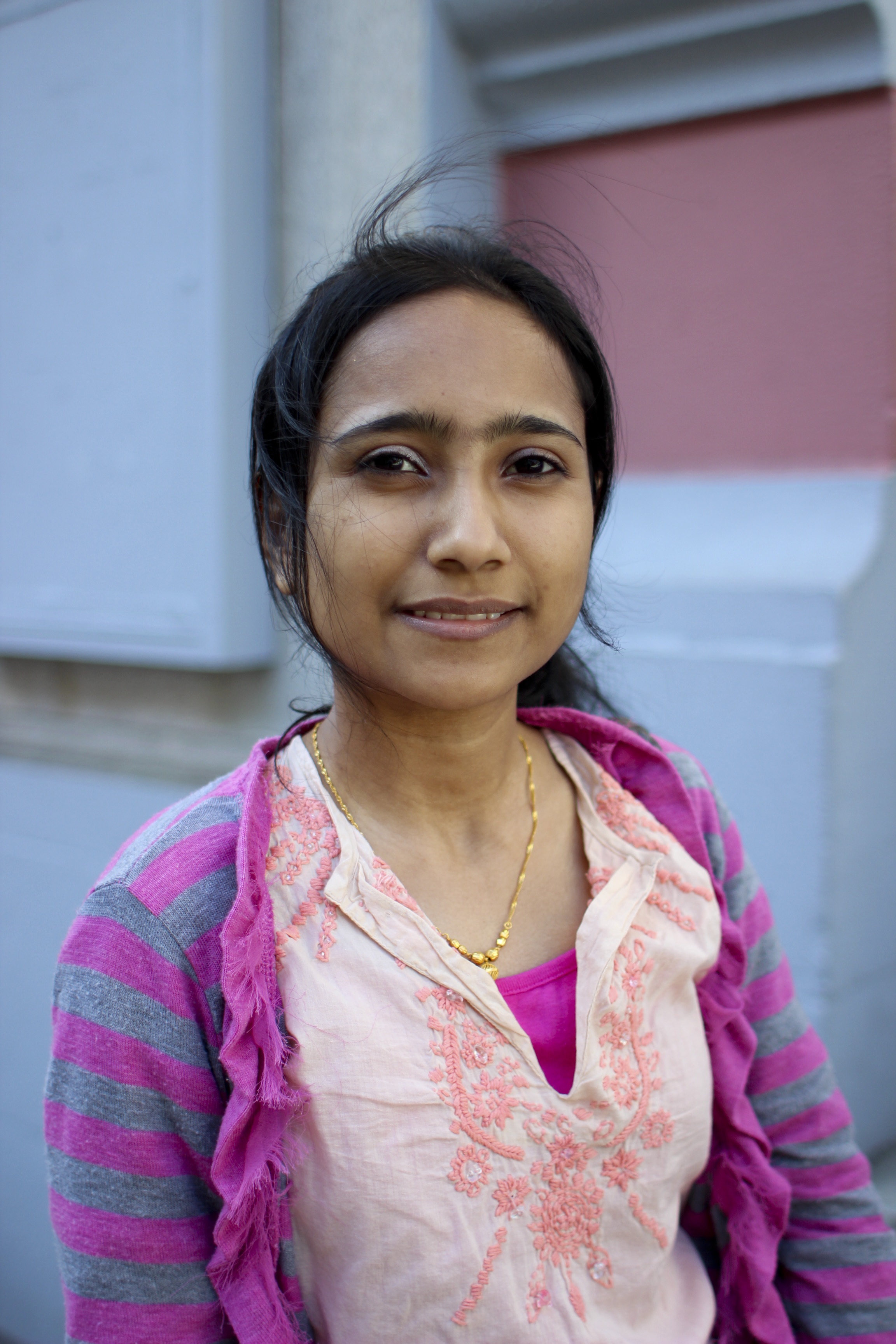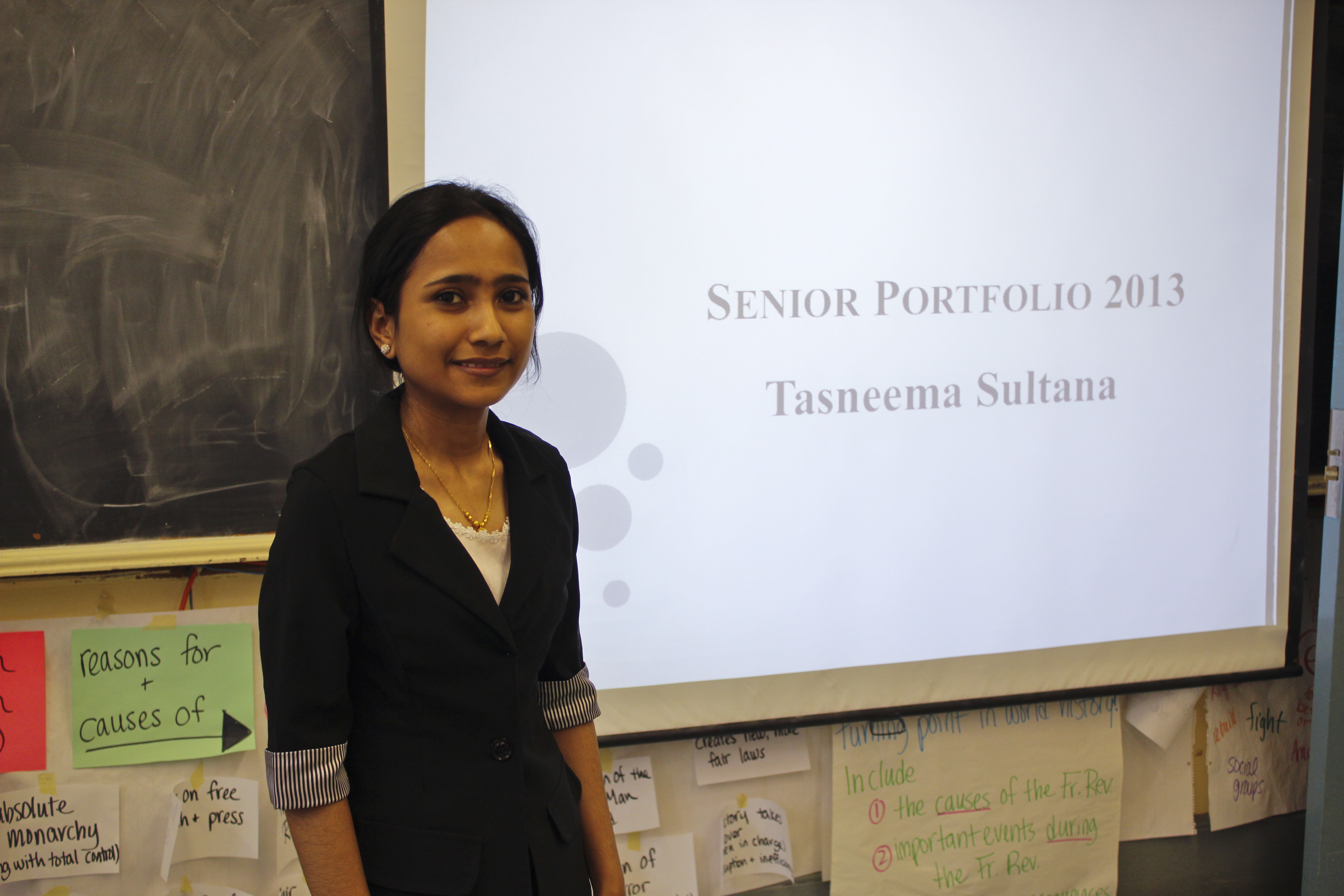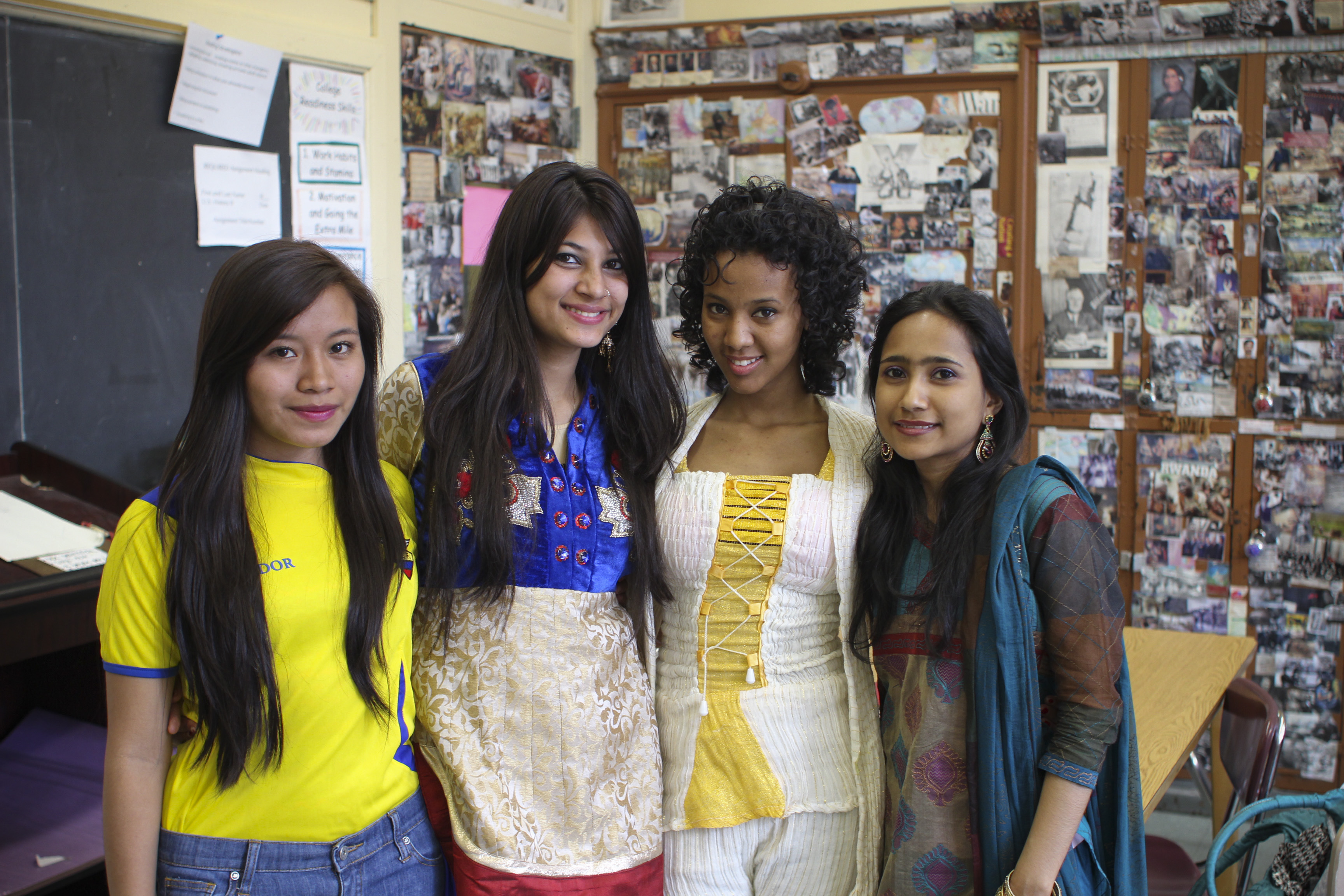
Follow high school senior Tasneema Sultana as she puts the finishing touches on her senior portfolio. The portfolio is part of the performance assessment system used at Manhattan International High School. Students complete the portfolio instead of taking five Regents exams.
March 11, 2013
One week before the due date of a major requirement for graduation, most high school seniors might be anxious, spending long hours studying for a full load of Regents exams. But Tasneema Sultana was calm, cheery even, as she talked about her college essay draft, which her teacher had just returned.
“It was okay,” she said, referring to the feedback she received. “I try my best in English, but it is still B or B+, from 9th grade to now. In history and math I got better.”
Sultana, 20, is a senior at Manhattan International High School on the Upper East Side. She came to New York four years ago from her home country of Bangladesh. The school accepts students who have been in the country for less than four years and are classified by the Department of Education as English Language Learners – students who speak a language other than English at home and score below proficient on a test called the Language Assessment Battery-Revised.
Sultana’s college essay was going into her senior portfolio, which was due the following Monday. The portfolio is a collection of essays and research papers across school subjects that students at Manhattan International must submit in order to graduate. Instead of sitting for all the Regents exams, they take the English Regents in their junior year. Then in their senior year, they submit a written portfolio and give a 40-minute oral presentation. It’s all officially known as the performance assessment system.
Principal Gladys Rodriguez, who started leading the school this year but served as assistant principal for seven years before that, is a firm believer in the merits of the performance assessment system. “All portfolios are very personalized,” she said. “They demonstrate what students are capable of. It’s not ‘one size fits all’.” As long as they meet the requirements, they have a lot of choice in what topics to focus on and demonstrate their skills. “Standardized testing doesn’t tell us much about individual progress,” Rodriguez said.
Manhattan International is a member of the New York Performance Standards Consortium, which provides standards for the portfolio that have been approved by the state Board of Regents. For example, for the math project, under the “reasoning and proof,” standard, an “outstanding” student – that is, a student attaining the highest band of marks – is one who both “justifies all mathematical statements in an efficient and accurate manner, and draws valid conclusions” and “constructs, uses and tests one or more generalizations, and makes predictions.” On the other end of the scale, a student that “needs improvement” is one who “does not justify mathematical statements accurately, and does not draw valid conclusions.”
There are 28 small high schools in the consortium located in New York State and Manhattan International was one of the first to join. Manhattan International has been using the performance assessment system since it was founded in 1993 and their students are doing well. The school received an A grade on the Department of Education’s Progress Report last year, placing it in the 70th percentile of city schools, and its six-year graduation rate was 85.5 percent, higher than the citywide average of 77.0 percent. The number of students graduating after four years is less, at 63.6 percent, because students sometimes struggle in the beginning with the lessons being taught in English, and may have to repeat a year. Within six months of graduating, 49.2 percent of students are enrolled in a post-secondary program – just shy of the citywide average of 50.2 percent – and nearly all of these are in two- or four-year colleges.
Although students may be less stressed around Regents time, Rodriguez maintains that the portfolio is not an easy way out. “In some ways it may even make it more challenging” because they have to do it in English, she said. “They need to revise the pieces that go into the portfolio; some students have often worked on it for 20 drafts. Many of them wish they could just take a Regents exam and be done in three hours,” she said, laughing.
Sultana is not one of those students. “I feel like the portfolio is better because we really understand the subject,” she said.
“For Regents after you study hard for it and take it, then it’s over, you forget about it,” she said. But after spending so much time building a portfolio, “I think it will stay longer in our minds… We have to understand it first before we can talk about it and make the teacher understand.”
That Monday, Sultana and two other students had stayed back after classes for the weekly senior mentoring period where they met with their mentor, 12th grade history and government teacher Lori Sandler, to discuss the final details of organizing and submitting the portfolio.
A total of eight items go into the written portfolio: a college essay, a comparative essay of two literary pieces, a history research paper, a math paper, a science lab report, a personal piece, a résumé and a form showing the topics the student chose for his or her oral presentation.
Sandler, who taught at a Regents school before joining Manhattan International, thinks the standardized tests put students under too much pressure. She prefers the performance assessment system because of the relative freedom and the depth to which students can explore topics. “In Regents schools all they do is test prep,” she said. “Our students are trained to think and they’re trained to look in depth at issues because we have the luxury of time.”
For example, she said, she can spend more time teaching the class about the atomic bomb and less time on the Cold War. “Hopefully they’ve developed the thinking and reading skills to understand the topics on their own if they want to look them up later.”
During the mentoring session, Sandler encouraged Sultana and her other mentees to include all the drafts of their essays because that would show the process of improvement and learning. “It shows that it’s their own work,” she said, “months of work.”
Several of the essays were completed earlier in the year. Sultana is now revising her personal piece, a creative essay about wedding ceremonies in Bangladesh. For the personal piece, students are encouraged to present something close to their hearts, such as a poem in their native language that they translate and discuss, or a reflection on a performance that they did.
“In my country it is mostly arranged marriage, so my family tradition is involved in the personal piece,” Sultana said. “My family is against love marriage, and it may affect me because if I love someone, they may not allow.”
To research the essay, Sultana asked her mother about the reasons for the ceremonies and also relied on her personal experience watching her brother’s marriage back in Bangladesh last year. She wrote about the rituals, the beautiful clothing and jewelry brides wear, and the colorful decorations. “I would like to have my wedding ceremony like that,” Sultana said. “The only part I don’t like is the arranged marriage.”
Students at Manhattan International also need to pass the English Regents in their junior year, and give an oral presentation at the end of their senior year on topics in their portfolio. Sultana scored an 82 on her Regents exam, so the portfolio and presentation are all that stand between her and graduation. She has already been accepted at four colleges at the City University of New York and is thinking of studying nursing or accounting.
Sultana enjoys living in New York, although it was hard to get used to at first because the education system is also very different from what she experienced in Bangladesh.
“There, they don’t really learn, they just memorize things,” she said. “Homework and classwork doesn’t count, only exams. Students are scared of teachers, and if they’re scared, how to learn! They won’t ask questions.
“Here you can ask any questions you want.”
_____________________________________________________________________________________________
Apr 15, 2013
It was 9.30 p.m. on a Monday and Tasneema Sultana had not had her dinner.
Since getting home from school, she had been doing homework and putting the finishing touches on her PowerPoint presentation, which was to be screened during her oral grading the following Thursday.
She had been working hard since the weekend, when she had also put in 15 hours at her part-time job at a Burger King in the East Bronx.

“I work because my family gets a little help from it,” she said, “And I don’t like to ask my brother and sister for money.” But it is hard for her to interact with customers in English sometimes, she added, because “they get mad so easily.”
Sultana lives in the Bronx with her mother, a housewife, and a brother and sister. The family is supported by her brother, Abu Mufazzol, 26, who works at Icahn stadium, and her sister, Samia, 22, who also works part-time at Burger King and is a student at Bronx Community College. They send money to family in Bangladesh as well. Her father runs a business back home and visits for two or three months each year, but mostly stays in Bangladesh with Sultana’s four other siblings.
Here in New York, they speak Bengali at home, with a bit of English, Hindi and Urdu. Sultana is the most proficient in English in her family, sometimes helping Samia with her schoolwork. Despite this, she was still fairly worried about how the presentation would turn out.
“I feel stressed about standing up there and presenting because I’m very shy,” she said. “I didn’t talk in class a lot.”
“Before I present, I prepare myself but when I stand there I get nervous and forget everything. In freshman and sophomore years I was struggling, but for junior year, I got more used to it,” she said, referring to the end-of-semester presentations students make to practice for the senior presentation.
Every senior in Manhattan International High School has to give a 30- to 40- minute final presentation on their finest work, and can choose one, two or four topics. There is also a 15- to 20-minute question-and-answer session, during which the teachers can probe them further about the work. Sultana had decided in March that she would present her history research on the atomic bomb, as well as a biology lab. During the previous week, she had gone over the two sections of her presentation separately with her mentor, Lori Sandler, to check the timing and practice answering questions.
The oral presentation is part of the senior portfolio that all students must produce in order to graduate, which also includes the written portfolio submitted in March. Written portfolios are sent for external auditing whenever the New York State Education Department requests, and also for routine evaluations by the Performance Assessment Review Board. This board oversees the performance assessment system used in Manhattan International as well as the other schools in the New York Performance Standard Consortium. The oral presentations are open to auditors should they wish to sit in.
Preparing the senior portfolio is meant to ensure students have the skills and content knowledge needed to succeed in college. They do this instead of taking four out of the five Regents exams that most other high school students sit for – a model practiced by all the schools in the Consortium, which has taken a stand against standardized tests that are relied on as the sole determinants in crucial education decisions such as graduation.
Proponents of such alternatives to standardized testing praise their well roundedness and use of multiple types of assessment to measure student achievement. Standardized and high-stakes tests have been criticized for creating a culture of “teaching to the test,” where lessons and drills are solely focused on the content to be tested.
“In the state of New York, they use the tests to determine whether you are eligible for a high school diploma,” said Ann Cook, director of the New York Performance Standards Consortium. “The assumption is that you have learned certain things that will help you move forward to achieve whatever your next steps are. If that’s college, is there evidence to show that taking these tests is good preparation for college work?”
Cook thinks that the evidence indicates that the majority of the students who take tests to graduate are not ready for college. “They have to take remedial courses for which they have to pay,” she said.
In contrast, Cook said, the portfolios are a more accurate assessment of what students know and what they can do with what they know. “The students are indicating through their work that they have some deeper understanding of the material,” she said.
Cook points to data in a report produced last year by the Consortium titled Educating for the 21st Century. In the report, statistics from the National Student Clearinghouse and the National Information Center for Higher Education Policymaking and Analysis show that the consortium’s graduating class of 2008 remained in the second year of college at a higher rate than the national and state rates: 93.3 percent of consortium students stayed in four-year colleges in their second year, compared to 74.7 percent of students nationally and 80.8 percent of students state-wide. The numbers are slightly lower for students in two-year colleges, but consortium students still do better.
On the other hand, some education experts see the utility of standardized tests in providing some form of measurement of student learning for more number- and formula-heavy subjects, like math and physics. Peg Tyre, author of The Good School: How Smart Parents Get Their Kids the Education They Deserve, said, “If you’re going to do a portfolio, I don’t think it’s very good for some quantitative subjects like calculus.”
“Not all kids learn that way,” she added, of the performance assessment system. “In this kind of student-directed learning, it’s great if you’re a middle-class kid, but if you’re a low-income kid and don’t know that much about the world, is that helping? Like for history, someone needs to tell you that things happened before you were born, and they were meaningful, and you need to know them.”
This view is echoed by Jay Greene, head of the department of education reform at the University of Arkansas and author of Education Myths: What Special-Interest Groups Want You to Believe About our Schools – and Why It Isn’t So. In his book, he argues against critics who say that standardized tests used by accountability programs do not measure sophisticated skills such as critical thinking, which they see as “real learning.” Greene writes that greater priority should be given to teaching basic reading and math skills, especially for poor and minority students.
However, so-called English Language Learners, like the students Manhattan International serves, tend to perform worse on standardized tests than native English speakers. A 2010 report published by the Center on Education Policy based on data collected from state departments of education found that at the elementary, middle and high school levels, fewer English Language Learners were achieving the proficient level on state tests than non-English Language Learners in 2008. For example, at the high school level across 35 states with sufficient data, the median percentage of English Language Learners scoring proficient on reading tests was 31 percent, as compared to 76 percent for non-English Language Learners. For math tests, the median percentage of English Language Learners scoring proficient was 32 percent, compared to 65 percent for non-English Language Learners.
Nevertheless, while trying to stay away from the one-size-fits-all approach of standardized testing, schools should be aware that not all students may benefit from the portfolio approach either, said Tyre.
“I think that some kids could slip by without knowing very much,” she said. “I don’t think [portfolios] are a panacea.”
____________________________________________________________________________________________
Apr 18, 2013

Tasneema Sultana stood at the front of her classroom, waiting for the two other evaluators to arrive. Her teacher mentor, Lori Sandler, had already set up the projector and the laptop to screen Sultana’s PowerPoint slideshow, which had been painstakingly put together and revamped over two weeks.
“In the morning I was okay, but now the time is going faster so I’m nervous,” Sultana said.
She was dressed in black pants and a black blazer, which she bought three weeks earlier at a PayHalf especially for the occasion and had to take in as it was too big for her small frame. She had considered wearing high heels but decided that they would make her more nervous and make noise when she moved around as she presented. Instead, she wore low-heeled black pumps. Her hair was tied neatly into a ponytail and a gold necklace adorned her plain cream blouse.
In other classrooms throughout Manhattan International High School, four other seniors were also making their final preparations. Finally, Sultana’s evaluators were seated and the lights had been turned off.
“Good afternoon,” she began. “Today I’m going to present my senior portfolio.”
And she was off, winding through a road map of arguments, numbers and hypotheses on 31 slides. She had notes in front of her, but rarely referred to them, instead looking at the slides on the laptop or directly at the three people who would decide whether she passed or failed, whether she graduated or was retained.
The diminutive girl – at 4’11” and weighing all of 80 pounds – stood behind a lectern that reached almost to her shoulders as she spoke to Sandler and the other two teachers, an English teacher and a math teacher from the school.
Sultana told them first about the atomic bomb and the arguments for its use to end World War II, and then about a biology lab to investigate the role of soil salinity on seed germination. One of the ways salt gets into the soil is during floods from seas, which is what happens in her home country of Bangladesh. “In my country there are floods every year,” Sultana told her audience. “If the seeds are already planted in the ground then it cannot germinate, if the plants are already growing then they can also be affected by salt an die.” A question-and-answer session followed each half of the presentation.
It was the culmination of a year of research and learning. Actually, Sultana had been preparing for this day since she first stepped into Manhattan International three and a half years ago and was forced to start speaking English. Students also do a mini oral presentation every year before they move on to the next grade.
After the final question was answered, Sultana was asked to wait outside the classroom while the three teachers evaluated her performance. Students are deemed “outstanding”, “good”, “competent” or “unacceptable” on 11 components such as how robustly they cover the material in their presentations. For three of the components – level of language use, accuracy of content and originality (students cannot plagiarize work) – students have to get at least a “competent” in order to pass. They also cannot receive more than four “unacceptable” grades. Sandler said students sometimes fail, but they are given a second chance to present again that year in front of the same panel.
After 10 anxious minutes in the hall, during which Sultana’s friend tried, unsuccessfully, to get her to peek into the classroom to see what was being said, Sultana was ushered back into the classroom to find out her results.
She scored a “good plus” overall, with three components between “good” and “outstanding” and one “outstanding” component. The teachers said they loved how she presented herself, from her confidence and poise to her well-chosen outfit. “There’s something charming about her,” said Bonnie MacSaveny, the English teacher. They also felt that she answered difficult questions thoughtfully and seemed very comfortable with the material. On the other hand, they wanted her to use more sophisticated synonyms (“ ‘The economy went down’ is so 10th grade,” said MacSaveny) and vary her tone and volume more (“Like a band, can you listen to a violin for 40 minutes? You need to throw in a drum, you need to throw in a trumpet,” was MacSaveny’s analogy).
“You did a very good job and I’m so proud of you,” Sandler said to Sultana, whom she has been supervising this school year.
She sees the senior presentations as good indicators of students’ progress and achievement. Later, in an interview, she said, “When you consider that four or five years ago they did not speak English and today they’re standing up here and speaking for an hour, we really do see that they’re ready to graduate.”
Graduation and what lies beyond was also on everyone’s minds at the presentation. Before they left, the teachers wished Sultana all the best for college and asked what her plans were. She said she is going tthe New York City College of Technology, and will probably study nursing.
“Nursing! How are you going to do nursing, can you lift someone?” MacSaveny joked with the petite girl in front of her. “Are you strong?”
“Yeah, I’m strong, in my heart,” Sultana answered.

The hardest part of her day over, Sultana headed to the auditorium, where her friends were rehearsing for the next day’s event: Culture Day, an annual Manhattan International institution where students bring food from their home countries and put on performances and catwalks to showcase their traditional outfits. Sultana was all smiles, belying her slight disappointment at not having received more “outstanding” marks from the teachers. She was met with hugs and congratulations, as well as questions from students who would be giving their own presentations in the weeks to come. Everyone seemed in a celebratory mood, partly in light of the upcoming festivities, and also because about a quarter of the seniors had also finished their presentations since the presentation period began last week.
The next day, Sultana would go out with some of her friends after school to celebrate. But first, she would go back home to prepare samosas, a Bengali snack, for Culture Day. She would have liked to celebrate on the weekend but “that will be hard because I have to work,” she said.
In the month before summer, she will still have to worry about things like classwork and helping her family make ends meet. But she is sure about one thing: “I definitely know I’ll graduate.”



